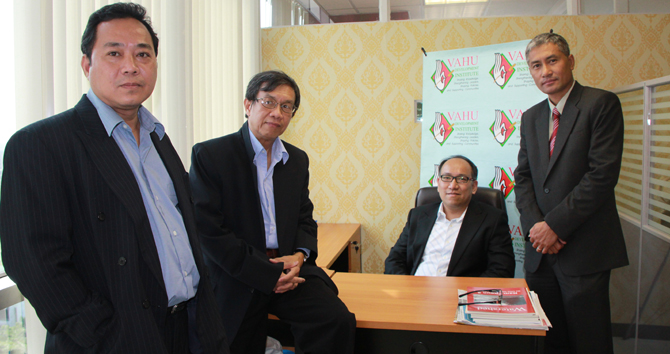While the Myanmar military regime is torching villages, committing extrajudicial killings and launching indiscriminate attacks on civilians, junta adviser Dr. Zaw Oo says there is a need for “good civil-military relations” and urged anyone involved in Myanmar issues to take his call seriously.
“So far no one has put it on the table. Only when it’s taken seriously into consideration, I think, can the crisis we are in be solved,” he told Radio Free Asia (RFA)’s Burmese Service on Tuesday in an interview on the sidelines of a public forum about the Myanmar coup and its aftermath at Chulalongkorn University in Bangkok. He was among five speakers at the forum.
Dr. Zaw Oo is a member of the advisory board formed by the regime on July 13 to reform the Myanmar Development Institute (MDI)—an economic research think tank formed by the ousted National League for Democracy (NLD) government in 2017 to support economic reforms in the country. Its director was Sean Turnell, an Australian economist who was arrested and charged by the regime after last year’s coup. The junta abolished the institute on Feb. 22, 2021.
He is the executive director of the Center for Economic and Social Development (CESD), an independent think-tank working on inclusive development in Myanmar. From 2012-2016 he was a presidential economic adviser for the military proxy Thein Sein government, serving as a principal adviser on finance, industry, commerce and labor issues. He is also the managing director at Bower Group Asia Myanmar Co. Ltd, which is under Bower Group Asia, a strategic advisory firm that specializes in the Asia-Pacific.
‘Just military-military relations’
The one-time presidential adviser also praised his former boss, ex-general Thein Sein, for maintaining good civil-military relations as the head of a so-called civilian government that took office in 2011 via a sham election. The Thein Sein administration was succeeded by the NLD government led by Daw Aung San Suu Kyi in 2016 after the party won a landslide election. The military staged a coup against the NLD government in February last year.
“President U Thein Sein managed civil-military relations well during his tenure. If that kind of management had survived, I believe the management of politics and the economy would be better than now,” he said during the interview, referring to the economic and political turmoil Myanmar has experienced since the military coup last year.
Dr. Zaw Oo said staging a coup in the 21st century is out of date, but added that having good civil-military relations was very important and “anyone working on Myanmar issues should take it seriously,” pointing to neighboring Thailand, which has also seen military rule in recent years, as an example to follow.
“Their civil-military relations are properly managed without the challenges we are facing in our country. Their economy is not in trouble and moving forward,” he said.
But a local political analyst rejected Dr. Zaw Oo’s claim that the country experienced good civil-military relations during Thein Sein’s tenure, saying the administration at the time consisted of a bunch of ex-military officials who had simply swapped their uniforms for suits.
“It was merely a relationship between former soldiers and serving soldiers. It wasn’t a question of good relations,” he said on condition of anonymity due to security concerns.
“He sounds as if he’s blaming the NLD government for not having good relations with the military, while praising U Thein Sein. Then, he envies Thailand. He is encouraging military rule in the country,” he said
The political analyst said Dr. Zaw Oo was covering up for the regime by promoting good civil-military relations while ignoring the root cause of Myanmar’s suffering today: the military coup.
Myanmar has been on the verge of becoming a failed state since the military takeover last year. More than 19 months on after the coup, the country’s economy is now in an unprecedented downward spiral with dwindling foreign reserves. Shortages of imported fuel have become more frequent due to instability in the foreign exchange rate, which keeps hitting record highs on a daily basis, worsening the people’s suffering. At the same time, the regime has committed atrocities like extrajudicial killings, torching whole villages and launching airstrikes against communities in anti-regime armed resistance strongholds.
Dr. Zaw Oo didn’t respond to The Irrawaddy’s request for comment on Thursday.
Switching sides
Prior to his role as a presidential economic adviser, Dr. Zaw Oo was a member of the All Burma Students’ Democratic Front (ABSDF), a student rebel group born out of the 1988 pro-democracy movement.
He was also a policy adviser to the National Coalition Government of the Union of Burma (NCGUB), the then-government in exile, and director of the Burma Fund, the NCGUB’s think tank. In these roles, he was an outspoken opponent of the regime.
Dr. Zaw Oo later co-founded the Vahu Development Institute (VDI), a Thailand-based think-tank founded in 2006 to engage in policy advocacy on democratization and strengthening civil society in Myanmar.
The other VDI founding members were U Aung Naing Oo, U Aung Thu Nyein and U Tin Maung Than.

U Aung Naing Oo was a member of the ABSDF and later worked for the Thein Sein government on peace negotiations with Myanmar’s ethnic armed groups. To facilitate the negotiations—with the full blessing of Thein Sein—they founded the Myanmar Peace Center (MPC), a government-affiliated, Western-funded NGO where everyone, most of them anti-Daw Aung San Suu Kyi and NLD, had a good time enjoying a cash bonanza brought in by the as-yet-unfinished peace process. He is widely regarded as having cozy relations with the military.
In November last year, he wrote a letter to international embassies claiming that he was among three people on a “hit list” put out by Myanmar’s parallel National Unity Government (NUG) and its armed wing, the People’s Defense Force (PDF). The NUG rejected his claim and the hit-list turned out to be imaginary.

















